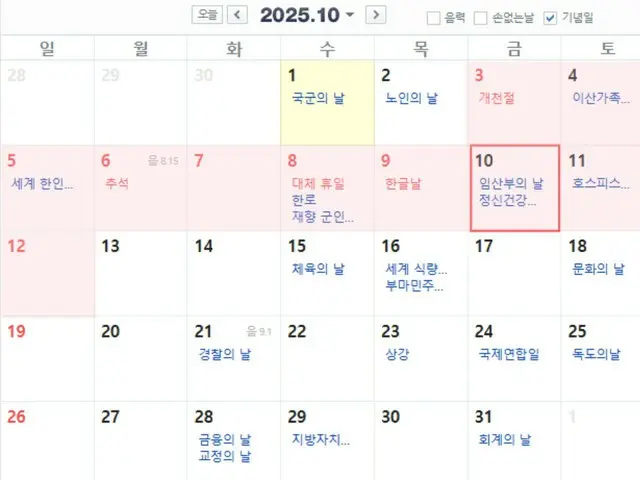Office workers are paying close attention to whether this will be possible. October 3rd is Foundation Day, the 4th is a Saturday, the 5th to 7th are a mid-autumn celebration holiday, the 8th is a substitute holiday, and the 9th is Hangul Day.
In addition, if the 10th is designated as an emergency public holiday, a 10-day consecutive holiday will be possible, including the weekend of the 11th and 12th.
However, some have pointed out that the effect is unclear, and it is unclear whether October 10th will be designated as an emergency public holiday.
Temporary public holidays have been designated to stimulate the economy and guarantee people's right to rest, but some analysts say that the effect of stimulating domestic demand has not lived up to expectations.
On the 13th, the National Assembly Legislative Research Service published an article titled 'The pros and cons of designating temporary public holidays: stimulating domestic demand and guaranteeing the right to rest.'
The report, "Reality and Limitations," said that the effect of designating temporary public holidays on stimulating domestic demand was limited. Rather, it said that there were many shortcomings, such as a decline in exports and production and the emergence of blind spots in the protection of the right to rest.
First, the analysis said that as people have become financially comfortable and holidays become longer, the number of people choosing to travel abroad rather than domestically has increased significantly. In particular, January 27th this year was designated as an emergency public holiday, resulting in a '6-day holiday.'
However, the effect of boosting domestic demand was minimal as more people went on overseas trips. The report states, "As the Lunar New Year holiday was longer than usual this year, more Koreans went overseas.
The number of overseas tourists in January was 2.973 million, up 9.5% from the previous month and 7.3% from the same month last year, the highest monthly figure ever.
Consumer spending was down 7.4% from the previous month and 1.8% from the same period last year. The adverse effect of the reduction in production and exports due to the reduction in the number of operating days cannot be ignored. The number of operating days in January was 20, and the size of exports in January this year was
The decline was 10.2% compared to the same month last year, and the decline in industrial production was also 1.6% compared to the previous month and 3.8% compared to the same month last year. The report said, "Due to the poor overall economic situation, the decline in production is being driven by factors including temporary public holidays.
"It cannot be said that this is due to the long consecutive holidays, but it can be said that the reduction in the number of operating days has had a certain impact," the article said. There are limits to the justification for guaranteeing the right of people to rest.
This is because workplaces with fewer than four employees are exempt from the temporary public holidays. The report states, "As of 2024, of the total employed population of approximately 28.57 million people, approximately 9.99 million people will work at businesses with one to four employees.
It is expected that most of them will be excluded from the application of temporary public holidays.
"Instead, it would be better to resolve this through the establishment of an institutional system such as expanding alternative public holidays and introducing a system of designated public holidays."
2025/06/14 20:35 KST
Copyrights(C) Herald wowkorea.jp 83

